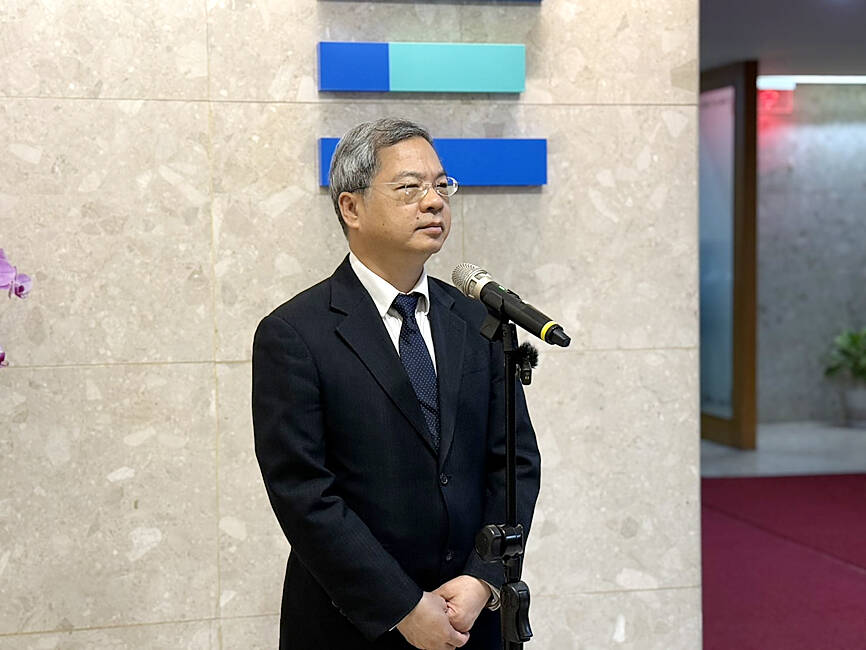Taiwan has signed investment promotion and protection agreements with the UK and Canada to facilitate local manufacturers’ investments in the countries, Minister of Economic Affairs Kung Ming-hsin (龔明鑫) said yesterday.
President William Lai (賴清德) on Tuesday told a trade event that the government has been working to advance investment promotion and protection agreements, as well as double-tax relief pacts to help local industries expand their global deployment.
The UK ranked eighth in trade with Taiwan last year, with a trading volume of US$1.32 trillion, while Canada was 14th with US$1.14 trillion, ministry data showed.

Photo: CNA
Kung said he also met with the Singaporean trade representative in Taipei on Wednesday to discuss renewing the investment promotion and protection agreement between the two sides to upgrade a pact they signed 40 years ago.
The government expects to reach an agreement with Singapore soon, while Indonesia has also expressed willingness to renew its pact with Taiwan, he said.
The main purpose of an investment protection agreement is to provide government-backed safeguards for investors, reducing political risks in host countries — such as foreign-exchange controls, expropriation, nationalization, confiscation, or the effects of war, insurrection or civil unrest, the Department of Investment Promotion Web Site says.
The main elements of the agreement include its scope, investment promotion and protection measures; investment treatment; expropriation, war, rebellion and riot-related damage compensation; terms for repatriation of capital and proceeds; dispute settlement; subrogation; applicability of the agreement; validity period; and termination, the ministry said.
The agreement, which also includes regulatory details, is designed to facilitate and promote closer economic, trade and investment relations between the signatory states, it said.
While the US House of Representatives in January passed the US-Taiwan Expedited Double-Tax Relief Act, the bill is still waiting to be introduce in the US Senate, Kung said.
The government hopes the act can be taken up by the Senate as soon as possible, but its timing depends on its schedule, as lawmakers have many bills to review, he said.
Senators appeared to have no major concerns about the act when he visited the US in May to discuss the issue, he added.

PERSISTENT RUMORS: Nvidia’s CEO said the firm is not in talks to sell AI chips to China, but he would welcome a change in US policy barring the activity Nvidia Corp CEO Jensen Huang (黃仁勳) said his company is not in discussions to sell its Blackwell artificial intelligence (AI) chips to Chinese firms, waving off speculation it is trying to engineer a return to the world’s largest semiconductor market. Huang, who arrived in Taiwan yesterday ahead of meetings with longtime partner Taiwan Semiconductor Manufacturing Co (TSMC, 台積電), took the opportunity to clarify recent comments about the US-China AI race. The Nvidia head caused a stir in an interview this week with the Financial Times, in which he was quoted as saying “China will win” the AI race. Huang yesterday said

Japanese technology giant Softbank Group Corp said Tuesday it has sold its stake in Nvidia Corp, raising US$5.8 billion to pour into other investments. It also reported its profit nearly tripled in the first half of this fiscal year from a year earlier. Tokyo-based Softbank said it sold the stake in Silicon Vally-based Nvidia last month, a move that reflects its shift in focus to OpenAI, owner of the artificial intelligence (AI) chatbot ChatGPT. Softbank reported its profit in the April-to-September period soared to about 2.5 trillion yen (about US$13 billion). Its sales for the six month period rose 7.7 percent year-on-year

MORE WEIGHT: The national weighting was raised in one index while holding steady in two others, while several companies rose or fell in prominence MSCI Inc, a global index provider, has raised Taiwan’s weighting in one of its major indices and left the country’s weighting unchanged in two other indices after a regular index review. In a statement released on Thursday, MSCI said it has upgraded Taiwan’s weighting in the MSCI All-Country World Index by 0.02 percentage points to 2.25 percent, while maintaining the weighting in the MSCI Emerging Markets Index, the most closely watched by foreign institutional investors, at 20.46 percent. Additionally, the index provider has left Taiwan’s weighting in the MSCI All-Country Asia ex-Japan Index unchanged at 23.15 percent. The latest index adjustments are to

CRESTING WAVE: Companies are still buying in, but the shivers in the market could be the first signs that the AI wave has peaked and the collapse is upon the world Taiwan Semiconductor Manufacturing Co (TSMC, 台積電) yesterday reported a new monthly record of NT$367.47 billion (US$11.85 billion) in consolidated sales for last month thanks to global demand for artificial intelligence (AI) applications. Last month’s figure represented 16.9 percent annual growth, the slowest pace since February last year. On a monthly basis, sales rose 11 percent. Cumulative sales in the first 10 months of the year grew 33.8 percent year-on-year to NT$3.13 trillion, a record for the same period in the company’s history. However, the slowing growth in monthly sales last month highlights uncertainty over the sustainability of the AI boom even as